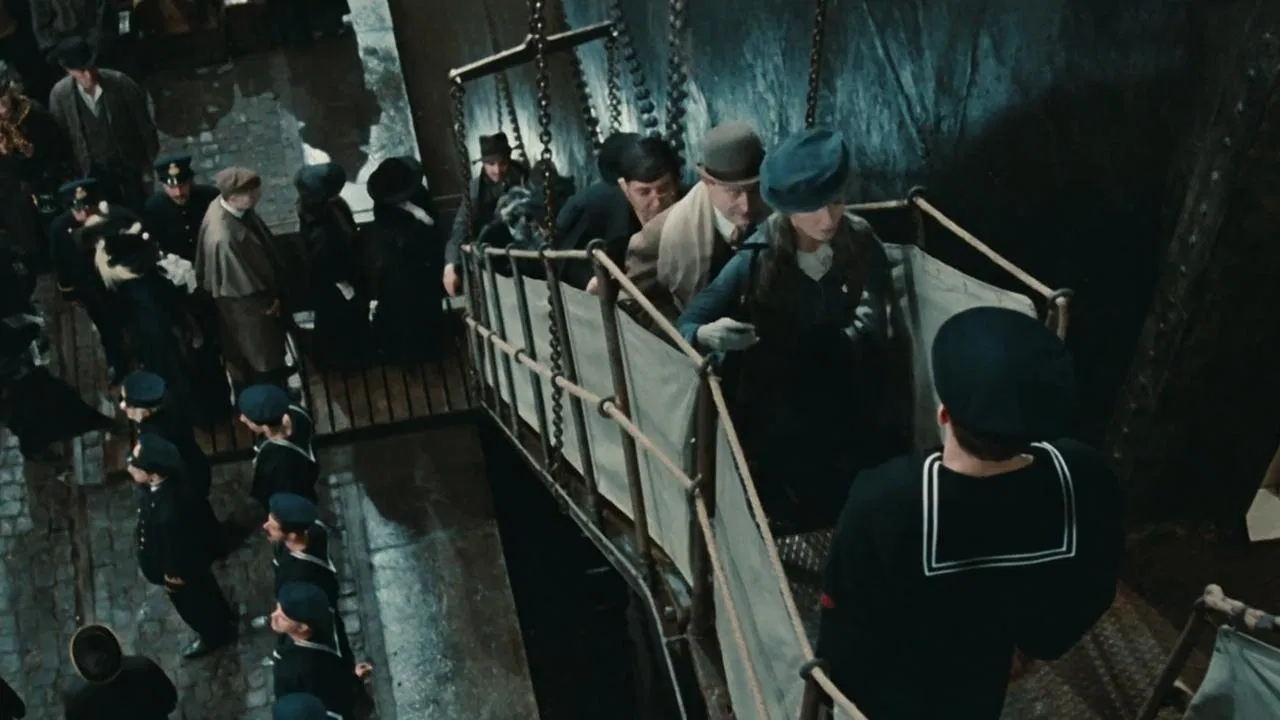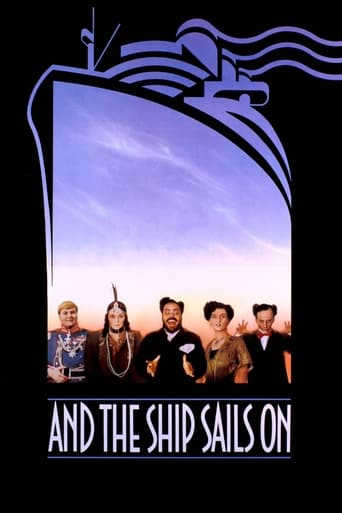


Very interesting film. Was caught on the premise when seeing the trailer but unsure as to what the outcome would be for the showing. As it turns out, it was a very good film.
... View MoreA lot of perfectly good film show their cards early, establish a unique premise and let the audience explore a topic at a leisurely pace, without much in terms of surprise. this film is not one of those films.
... View MoreThe thing I enjoyed most about the film is the fact that it doesn't shy away from being a super-sized-cliche;
... View MoreStory: It's very simple but honestly that is fine.
... View MoreFellini is a visionary mystic. He sees what he knows before he figures it out. So we have set design, costume design, even character design, before he fills things in with his narratives and allegories. I know this, so don't come to be disappointed when the stories and allegories do not quite work. It is the sign of risktaking that he allows his vision to outrace his sense.Shakespeare thought "The Tempest" would be his last play. The technology of the stage had left him behind, so in a sort of final flourish built a play that exploited the new special effects, costume and stage technologies, far better than his contemporaries. And within that he placed a surrogate of himself. The play is full of deep observations on the nature of life and reason. Each of these is essential to his purpose, which was to present himself through ideas. Few of these were necessary to advance the story. Much was made of the plays within the play and who controls what elements of themFellini similarly believed this to be his final film. At 62, already advised that his heart would give out, he poured everything he wanted to say into this. Yes, he always did that, but this time he used "The Tempest" as his guide. Afterwards he would go to Peru for inspiration.The film is folded into a literal opera, an opera about the life of a famous opera star, which morphs from small stories (a singoff in the boiler room) into an opera of war.Orthogonally, the film is folded twice into an inner film being made of the event and an outer film of the film. The way we are introduced to these two devices simultaneously is one of the most trilling beginnings in the history of cinema. There is an inner, inner séance. As a film experience, it is much like "Duck Soup," where the fakery and frippery is exposed and unremarked on: in the thing itself; in the ridiculous pomp of "royalty;" in the strutting of the artists, all conflated.I would have been tempted to give this the honor of being one of the two Fellini films I set as fours. That would be because when a man prepares to die, it matters what he says. But it so happens that he thought the same before the two I picked.Ted's Evaluation -- 3 of 3: Worth watching.
... View MoreEveryone seemed to expect something special from Fellini later in life, as if all that had gone before was just preparation for a master oeuvre that would make us fall to our knees. In that sense, he kept disappointing, and with this film probably more than most. There's nothing here but quaintness and nostalgia, with a gentle, almost Tati-esquire humour – intellectually, he was going backwards, if anything. Twenty-odd years later, Fellini is now fully in context and it is easier to accept. This is what Fellini did – like it or not - the simple observation of harmless caricatures, which is actually engaging, enjoyable, even a little intriguing. Nobody is intrinsically good or bad; everyone is a set of circumstances, more or less fortunate or unfortunate; nobody harbours grudges – even here – especially here, on the eve of World War I, the end of a golden era of genteel innocence.The first time I watched this I took against Freddie Jones' MC character. This time I liked him, or rather sympathised with him – mainly on account of the fact that since then I used to live in the next village to him in Oxfordshire where he was a well-known and amiable local character. Still regrettable though that he was clearly directed here to copy Giuletta Masina's gestures and mannerisms as closely as possible. As a journalist following events, he introduces us to the passengers on a luxury liner taking a group of opera singers, impresarios and dignitaries – including the Austrian Grand Duke – to the funeral-at-sea of a beloved diva. All of them are eccentric or charming in their own way and a succession of quaint scenes ensues as the voyage progresses – including a hypnotised chicken, a sickly rhinoceros, and a memorable scene in which the singers perform for the stokers high above the boiler room (quite a bit of this was clearly parasitised by Tornatore in "The Legend of 1900").It all has a deliberate artificiality about it. The sea, rising and falling serenely behind the windows, is, on closer examination, made of plastic sheet. At the end, the camera pulls back to display the set and the crew – a simple indication that we are all part of some grander machination, that we are all a bunch of fools on a sinking ship, and if we all took life a little less seriously, we might enjoy it a good deal more. Once you've got in the right frame of mind, this is highly enjoyable.
... View MoreThis film combines whole elements that summarize the meaning of greatness.A moving masterpiece that explores every aesthetic possibility given by Cinema. Image, sound, music, movement, narration, color, tonality, character, humor, drama. A venture towards artistic sublimation within a story of exquisite taste.
... View MoreFellini accomplishes more in the first 15 minutes than many directors accomplish in a film. His ending (as always) is equally superb. Don't think I'm suggesting the middle is poor! Watch this instead of Titanic.
... View More